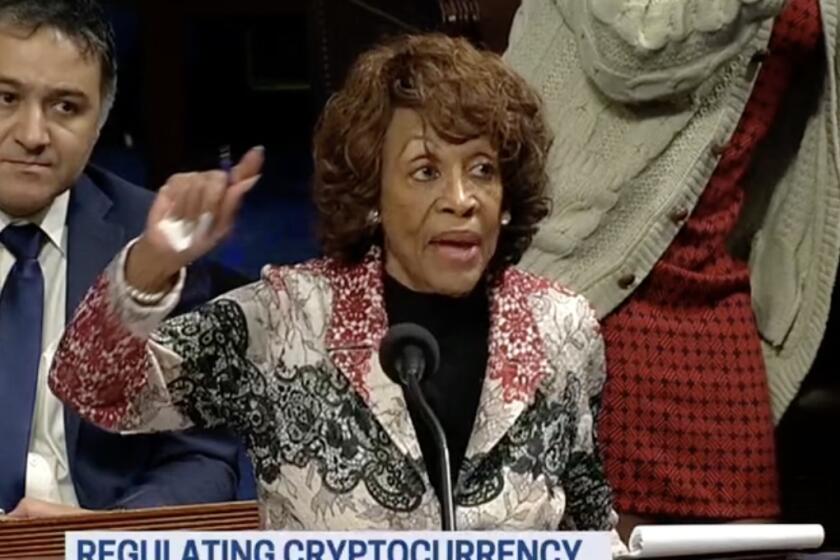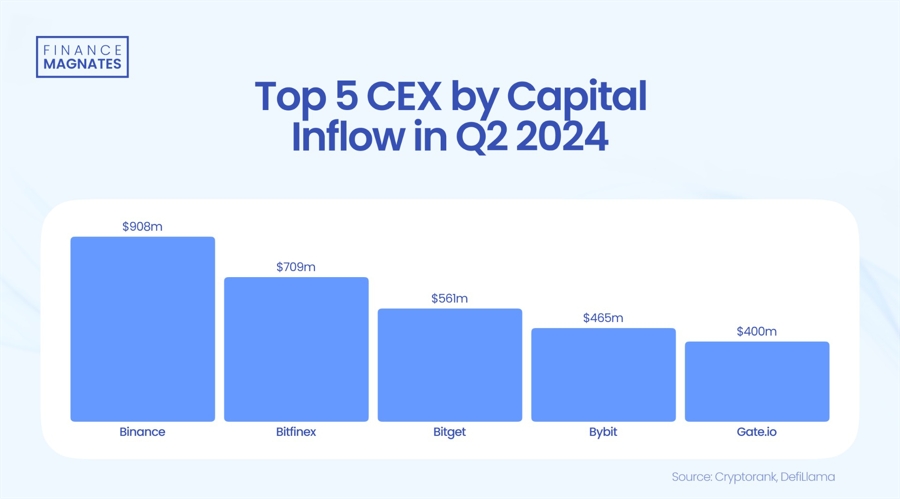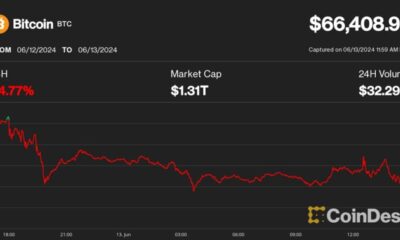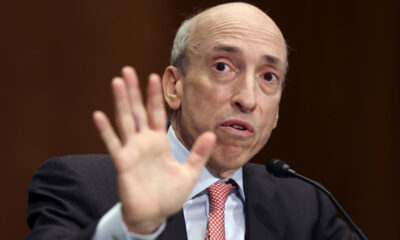News
Con il consenso democratico, la Camera vota per aprire delle lacune nella regolamentazione delle criptovalute

La deputata Maxine Waters (D-Los Angeles) ha provato mercoledì a spiegare ai suoi colleghi della Camera perché la riduzione delle normative sulle criptovalute danneggerà investitori e consumatori. (C-SPAN)
Il denaro, come tutti sappiamo, è il latte materno della politica in America. Può sembrare ancora più nutriente se puoi produrlo tu stesso.
Questo è sicuramente ciò che spiega la sollecitudine che l’industria delle criptovalute ha ricevuto dal Congresso.
Mercoledì la Camera ha approvato una legge che riduce la regolamentazione delle criptovalute, nonostante ampie prove del fatto che questa classe di asset sia stata un rifugio per truffatori, estorsori e peggio.
La legge “renderà gli Stati Uniti più sicuri per i trafficanti di droga, per i finanziatori del terrorismo, per i trafficanti di bambini e di droga e per coloro che acquistano e vendono materiale pedopornografico”, ha affermato il deputato Sean Casten (D-Ill.), elencando alcuni dei casi documentati. utenti di criptovalute negli ultimi anni. “Non sapevo che questi gruppi avessero sostenitori così orgogliosi al Congresso.”
Il record di fallimenti, frodi e fallimenti del settore delle criptovalute non è dovuto alla mancanza di regole o al fatto che le regole non siano chiare. È perché molti attori nel settore delle criptovalute non rispettano le regole.
Il presidente della SEC Gary Gensler
Casten potrebbe trovarsi nella minoranza della Camera in più di un modo. I promotori delle criptovalute sono riusciti a allontanare diversi democratici alla Camera e al Senato dalla forte opposizione del partito alla riduzione delle normative sulla classe di attività.
All’inizio di questo mese, le maggioranze bipartisan in entrambe le camere hanno votato per annullare una linea guida della Securities and Exchange Commission di due anni fa su come le istituzioni finanziarie dovrebbero tenere conto delle risorse crittografiche lasciate loro in custodia dai clienti. Il presidente Biden ha detto che lo avrebbe fatto porre il veto al cambiamentoe le maggioranze in nessuna delle due camere erano abbastanza ampie da annullare un veto.
Il caucus congressuale delle criptovalute ha regalato al settore un’altra vittoria mercoledì, quando la Camera è passata la legge sull’innovazione e la tecnologia finanziaria per il 21° secolo, noto come FIT21. Il voto è stato di 279 a 136, con 71 democratici che si sono uniti alla maggioranza repubblicana.
Il destino del provvedimento è incerto al Senato, che non l’ha ancora accolto. Biden lo ha fatto ha dichiarato la sua opposizione a FIT21 ma non ha promesso un veto, cosa che il gruppo cripto e i suoi sostenitori sembrano considerare una grande vittoria. Biden ha affermato di essere disposto a negoziare un sistema normativo che protegga i consumatori e gli investitori di criptovalute senza interferire indebitamente con l’innovazione, ma “sarà necessario ulteriore tempo”.
Se diventasse legge, FIT21 esaudirebbe il desiderio più sentito dei promotori di criptovalute: rimuoverli dalla giurisdizione della potente SEC e trasferire la supervisione alla Commodity Futures Trading Commission, cronicamente sottofinanziata e con personale insufficiente.
La storia continua
Il loro obiettivo è comprensibile, dal momento che la SEC è stata esplicita riguardo alla sua intenzione di regolamentare le criptovalute come titoli, sottoponendo l’asset class alle regole di divulgazione e alle tutele contro le frodi che hanno reso i mercati finanziari tradizionali negli Stati Uniti i più sicuri al mondo.
Per saperne di più: Colonna: Il sistema legale si sta avvicinando alle criptovalute e le cose potrebbero solo peggiorare
Durante il dibattito in aula di mercoledì, i sostenitori del disegno di legge hanno parlato delle virtù di liberare una tecnologia innovativa da “regolatori troppo zelanti” – si trattava della deputata Cathy McMorris Rodgers (R-Wash.), pronunciando parole che avrebbero potuto essere dettate dai dirigenti delle criptovalute – e sollevandoli dall'”incertezza normativa”.
Il presidente della SEC Gary Gensler ha messo da parte quest’ultima affermazione una dichiarazione su FIT21 ha pubblicato mercoledì poche ore prima del voto. “Il record di fallimenti, frodi e fallimenti del settore delle criptovalute non è dovuto alla mancanza di regole o al fatto che le regole non siano chiare”, ha affermato. “È perché molti attori del settore delle criptovalute non rispettano le regole.”
I sostenitori del disegno di legge hanno cercato di enfatizzare l’importanza delle criptovalute come asset finanziario affermando che il 20% degli americani sono proprietari di criptovalute. Non ci sono prove per questo. Al contrario, la Federal Reserve ha scoperto che l’interesse per le criptovalute tra gli americani comuni è debole e sta svanendo.
Nel suo indagine più recente sulla condizione economica delle famiglie statunitensi, pubblicato questo mese, la Fed ha stabilito che solo il 7% degli americani ha acquistato o detenuto criptovalute come investimento (in calo rispetto all’11% nel 2021) e solo l’1% le ha utilizzate per acquistare qualsiasi cosa o effettuare un pagamento. Ciò sottolinea la verità più importante sulle criptovalute, anche se i suoi promotori raramente riconoscono: nessuno ha ancora identificato uno scopo autentico per le criptovalute nel mondo reale.
“Le entità che trarranno vantaggio da questo disegno di legge non sono investitori ordinari che cercano di creare ricchezza”, ha detto mercoledì dall’aula della Camera la deputata Maxine Waters (D-Los Angeles), il democratico in carica nel Comitato per i servizi finanziari della Camera, “ma piuttosto le aziende crittografiche. … Hanno già guadagnato miliardi di dollari emettendo o agevolando illegalmente l’acquisto e la vendita di titoli crittografici.”
Waters ha descritto accuratamente l’effetto di FIT21 come l’inserimento effettivo delle criptovalute in una “terra di nessuno” normativa. Ha descritto il disegno di legge come “un approccio libertario MAGA estremo, in cui le aziende possono operare senza controllo normativo e i consumatori e gli investitori possono individuare ed evitare schemi fraudolenti da soli”.
Ciò che più colpisce della spinta per FIT21 è che arriva così a ridosso dei grandi scandali nel settore delle criptovalute. Sam Bankman-Fried, il fondatore della società di criptovaluta FTX, è stato condannato a marzo a 25 anni di carcere per frode crittografica, dopo essere stato condannato a novembre per sette capi d’accusa federali relativi alla frode.
Per saperne di più: Colonna: La truffa crittografica è in supporto vitale. Perché alcuni legislatori stanno cercando di dargli la RCP?
Durante il periodo di massimo splendore di FTX, Bankman-Fried è comparso davanti ai comitati del Congresso per promuovere uno schema normativo su misura per le criptovalute che somigliasse molto a quello incorporato in FIT21.
Proprio il mese scorso, Changpeng Zhao, fondatore della società internazionale di criptovalute Binance, lo è stato condannato a quattro mesi di carcere sulle accuse federali di riciclaggio di denaro; Zhao aveva precedentemente accettato di pagare una multa di 50 milioni di dollari, e Binance ha risolto il caso del governo contro di lui per 4,3 miliardi di dollari.
La SEC sta portando avanti una causa contro l’exchange di criptovalute Coinbase per la vendita di titoli non registrati. A marzo, il giudice federale Katherine Polk Failla ha negato la mozione dell’azienda di annullare il caso. Il suo ragionamento spiega efficacemente perché FIT21 non solo non è necessario, ma dannoso: “La nomenclatura ‘cripto’ potrebbe essere di epoca recente”, ha scritto, “ma le transazioni contestate rientrano comodamente nel quadro che i tribunali hanno utilizzato per identificare i titoli per quasi ottanta anni.”
Il contrappeso alle argomentazioni contro FIT21 è il contante: la varietà verde, non quella figurativa commercializzata dalle società di criptovaluta. Tre super PAC formati da dirigenti e investitori del settore cripto hanno raccolto circa 85 milioni di dollari da spendere nelle gare politiche del 2024.
La potenza finanziaria delle spese elettorali di questo settore non è in discussione. Uno dei PAC, Fairshake, ha speso più di 10 milioni di dollari nell’ultimo anno in opposizione alla deputata Katie Porter (D-Irvine) nella sua corsa per la nomina democratica al Senato degli Stati Uniti.
Porter era conosciuto come un forte critico delle criptovalute. Nel 2022 si è unita alla senatrice Elizabeth Warren (D-Mass.), la critica crittografica più rumorosa di Capitol Hill, in un’indagine su come il “mining” di criptovalute tramite computer avesse influenzato la rete energetica in Texas e l’aumento dei prezzi dell’energia per i consumatori.
Porter ha perso la corsa al Senato. Il suo avversario vittorioso alle primarie, il deputato Adam Schiff, ha assunto una posizione molto più indulgente nei confronti delle criptovalute, elencandole sul sito web della sua campagna tra le “nuovi sviluppi tecnologici… dobbiamo crescere” al fine di mantenere i posti di lavoro e la supervisione normativa nelle mani degli Stati Uniti.
Nell’attuale ciclo elettorale del Congresso, Fairshake ha donato 702.300 dollari alle campagne democratiche e 551.700 dollari ai repubblicani. Il suo più grande destinatario è il rappresentante Patrick McHenry (RN.C.), presidente del Comitato per i servizi finanziari della Camera e sponsor di FIT21. La sua campagna ha ricevuto 126.626 dollari anche se ha annunciato che non si candiderà alla rielezione quest’anno e che si ritirerà dal Congresso.
Nella sua dichiarazione, Gensler ha cercato di rafforzare la comprensione dei legislatori sui rischi che sostengono con questa misura. Il disegno di legge “creerebbe nuove lacune normative e minerebbe decenni di precedenti” nella regolamentazione dei contratti di investimento, ha scritto, “mettendo gli investitori e i mercati dei capitali a un rischio incommensurabile”.
Per saperne di più: Articolo: I sette verdetti di colpevolezza di Sam Bankman-Fried smascherano le criptovalute come una vera e propria truffa
Ciò consentirebbe ai promotori di criptovalute di “autocertificare” che i loro prodotti non rientrano nelle normative tradizionali e concederebbe alla SEC solo 60 giorni per rispondere. Rimuovendo le piattaforme di trading di criptovalute dalla struttura normativa che sovrintende agli scambi azionari e obbligazionari, si aprirebbe la porta a conflitti di interessi riducendo la protezione dei consumatori contro le piattaforme che mescolano i loro fondi con quelli dei clienti.
Il disegno di legge esenta inoltre i promotori di criptovalute dalle regole che richiedono che gli investimenti rischiosi siano offerti solo a investitori accreditati—quelli con un patrimonio netto superiore a 1 milione di dollari, senza contare la residenza principale, o un reddito superiore a 200.000 dollari (per le coppie, 300.000 dollari) in ciascuno dei due anni precedenti.
Il cinico dispositivo utilizzato da FIT21 per neutralizzare la supervisione della SEC sugli investimenti in criptovalute è quello di affidare questo compito alla CFTC. Come osserva l’organismo di vigilanza Better Markets, la CFTC ha un budget di soli 365 milioni di dollari, contro i 2,1 miliardi di dollari della SEC, e meno di 700 dipendenti, rispetto ai circa 4.500 dipendenti della SEC).
Il disegno di legge “accumulerebbe una serie completamente nuova di responsabilità sulla CFTC, rendendola il regolatore de facto di innumerevoli nuovi scambi di criptovalute e broker-dealer”, ha scritto Better Markets, anche se la CFTC “non ha i fondi per soddisfare tutti i suoi impegni”. attuali mandati statutari.”
Il dibattito di mercoledì che ha preceduto l’approvazione alla Camera del FIT21 è stato tipicamente stonato e pieno di affermazioni fittizie e fittizie. Il deputato Mike Flood (R-Neb.) ha invocato lo scandalo FTX, che ha visto miliardi di dollari in depositi crittografici di clienti e investitori stanziati illegalmente dai leader dell’azienda. “Dobbiamo garantire che ci siano norme di protezione che impediscano che qualcosa del genere accada di nuovo”, ha affermato.
Flood ha affermato che, secondo FIT21, a FTX sarebbe stato impedito di registrarsi come borsa di scambio e non sarebbe stata in grado di mescolare i suoi fondi con quelli dei suoi clienti. Viene da chiedersi di cosa stesse parlando. A FTX è stato impedito di registrarsi come exchange e non lo ha fatto. Perché? Perché Bankman-Fried, il suo fondatore, sapeva che così facendo avrebbe sottoposto l’azienda alla supervisione della SEC, a cui nessuno nel mondo delle criptovalute vuole sottoporsi.
Per quanto riguarda la commistione di fondi, è già illegale: è una delle pratiche che hanno portato Bankman-Fried in prigione.
La conclusione è molto chiara. Non c’è alcuna giustificazione per conferire alle criptovalute uno schema normativo tutto suo. I suoi promotori non hanno altro argomento se non quello di affermare che hanno bisogno di una regolamentazione leggera per promuovere l’”innovazione”, quando il risultato sarà quello di facilitare l’imbroglio dei clienti, il riciclaggio di denaro o lubrificare attacchi ransomware come quello che ha ha interrotto le operazioni cruciali della controllata Change Healthcare del gruppo UnitedHealthche gestisce i processi di rimborso per i fornitori di servizi sanitari a livello nazionale.
Se c’è un angolo del mondo finanziario che richiede una regolamentazione più severa, è proprio quello delle criptovalute. Per il Congresso anche solo contemplare un allentamento della regolamentazione già esistente è a dir poco assurdo. Ma il Congresso non risponde agli aspetti pratici; risponde al denaro. Questo è l’unico motore di iniziative come FIT21.
Ricevi le ultime novità da Michael Hiltzik
Commento sull’economia e altro da un vincitore del Premio Pulitzer.
Iscrivimi.
Questa storia è apparsa originariamente in Los Angeles Times.
News
Block Investors Need More to Assess Crypto Unit’s Earnings Potential, Analysts Say — TradingView News

Block, a payments technology company led by Jack Dorsey square could become a formidable player in the cryptocurrency mining industry, but Wall Street will need details on profit margins to gauge the positive impact of the business on earnings, analysts said.
Block signed its first large-scale cryptocurrency mining hardware pact on Wednesday, agreeing to supply its chips to bitcoin miner Core Scientific CORZbut no financial details were disclosed.
JP Morgan estimates the deal could net Block between $225 million and $300 million, but said more information will be needed to assess the hardware business’s long-term earnings potential.
“We still have a lot to learn in terms of the margins of this business, so we are hesitant to underwrite this transaction until we know more about the cadence and economics,” J.P. Morgan said.
The deal marks a major step for the payments company, which started out as “Square” in 2009 before rebranding in 2021 in a nod to its focus on crypto and blockchain technologies.
Dorsey, who co-founded and ran Twitter (now known as “X”), has long been bullish on Bitcoin. Block began investing 10% of its monthly gross profit from Bitcoin products into Bitcoin in April.
In the first quarter, nearly 9% of the company’s cash, cash equivalents, and marketable securities consisted of bitcoin.
“This development (the deal with Core Scientific) is further evidence of Block’s role as an emerging leader in the crypto hardware ecosystem,” Macquarie analysts Paul Golding and Emma Liang wrote in a note.
Analysts say similar deals to follow could further validate Block’s reputation in the industry.
But J.P. Morgan said the stock’s performance will be determined by Block’s other segments, such as Square and Cash App.
Block shares have lost nearly 17% this year.
News
This Thursday’s US Consumer Price Index could be a game-changer for cryptocurrencies!

3:30 PM ▪ 4 minute read ▪ by Luc Jose A.
This Thursday, attention will be focused on the United States with the anticipated release of the Consumer Price Index (CPI). This economic indicator could trigger significant movements in the markets, especially for the U.S. dollar and cryptocurrencies. While investors remain vigilant, speculation is rife about the potential impact of these key figures.
The Consumer Price Index: The Cornerstone of the American Economy
The Consumer Price Index (CPI) is a key measure of inflation which reflects changes in the price of goods and services purchased by American households. This index is calculated monthly by the Bureau of Labor Statistics (BLS) and serves as a barometer for the cost of living. The consumer price index covers a wide range of products, including food, clothing, housing, health care, and entertainment. Economists and policy makers closely monitor this data to anticipate economic trends and adjust monetary policies accordingly.
The June CPI data is due to be released this Thursday at 2:30 p.m., and is highly anticipated by investors. The current consensus is for headline annual inflation to decline to 3.1%, from 3.3% the previous month, while core inflation is expected to remain stable at 3.4%.
THE BIGGEST EVENT THIS WEEK 🚨
The U.S. Consumer Price Index is expected to
PUBLICATION TODAY AT 8:30 AM ET.EXPECTATIONS ARE 3.1% WHILE
LAST MONTH THE CONSUMER PRICE INDEX (CPI) WAS 3.3%HERE ARE SOME SCENARIOS 👇
1) CPI above 3.1%
THIS WILL BE A DAMAGE TO THE MARKET
GIVEN THAT THE LAST TIME THE CPI DATA… photo.twitter.com/yudjPLPl8g— Ash Crypto (@Ashcryptoreal) July 11, 2024
Consumer Price Index Release: What Does It Mean for the Dollar and Bitcoin?
Inflation as measured by the consumer price index is a key determinant of the value of the US dollar. If the consumer price index declines more than expected, it could reinforce expectations of a rate cut by the Federal Reserve in September, thus weakening the dollar. A weaker dollar could benefit GBP/USD, which recently broke a major resistance level, and Bitcoin, which could see its price rise due to increased demand from institutional investors.
Current forecasts suggest that headline inflation will decline to 3.1%, with core inflation holding steady at 3.4%. However, a surprise increase in the consumer price index could upset these expectations. Fed Governor Lisa Cook has mentioned the possibility of a soft landing for the economy, with inflation falling without a significant increase in unemployment, which could lead the Fed to consider rate cuts. This outlook is particularly favorable for stock markets and cryptocurrencies, including Bitcoin, which could benefit from a more accommodative monetary policy.
According to experts at 10x Research, especially their CEO Markus Thielen, Bitcoin could see a significant increase if the CPI data confirms a decline in inflation. Thielen indicated that Bitcoin could reach almost $60,000, a prediction that has already been reflected with a rise to $59,350 before the data was released.
Therefore, Thursday’s CPI data could determine the future direction of financial and cryptocurrency markets. High inflation could strengthen the US Dollarwhile a drop in inflation could pave the way for rate cuts by the Fed, thus giving a boost to Bitcoin and other digital assets.
Enhance your Cointribune experience with our Read to Earn program! Earn points for every article you read and access exclusive rewards. Sign up now and start earning rewards.
Click here to join “Read to Earn” and turn your passion for cryptocurrencies into rewards!
Luke Jose A.
A graduate of Sciences Po Toulouse and holder of a blockchain consultant certification issued by Alyra, I joined the Cointribune adventure in 2019. Convinced of the potential of blockchain to transform many sectors of the economy, I am committed to raising awareness and informing the general public about this ever-evolving ecosystem. My goal is to enable everyone to better understand blockchain and seize the opportunities it offers. Every day, I strive to provide an objective analysis of the news, decipher market trends, convey the latest technological innovations and put into perspective the economic and social issues of this ongoing revolution.
DISCLAIMER
The views, thoughts and opinions expressed in this article are solely those of the author and should not be construed as investment advice. Do your own research before making any investment decisions.
News
Crowd Expects Bitcoin Bounce Suggests Further Losses, As RCO Finance Resists Crash

Bitcoin is seeing a rebound after its recent price crash to $53,000. Other altcoins are subsequently recovering, with many cryptocurrency investors increasingly making new entries. However, Santiment warned against this hopium, suggesting that Bitcoin could extend its price losses.
As the broader market anticipates Bitcoin’s next price action, RCO Finance (RCOF) demonstrates resilience, attracting thousands of people in influxes. Read on for more details!
RCO Finance challenges the market crisis
RCO Finance (RCOF) is approaching $1 million in funding raised, amid growing interest from institutional traders seeking stability from Bitcoin’s wild price swings. While much of the broader market has seen significant price losses, RCO Finance has remained resilient, experiencing a surge in its pre-sale orders.
As a result, the project seems oblivious to the current market conditions, leading top market experts to take a deep dive into its ecosystem. They identified why RCO Finance was able to withstand the bearish pressure and its potential to hold up even stronger during the impending broader market crash.
The main reason was related to the innovative use of RCO Finance AI Trading Tools as a Robo Advisor. This tool has been integrated into RCO Finance’s cryptocurrency trading platform, offering full automation and highly accurate market forecasts to help investors make informed decisions.
Read on to learn more about this tool and other exciting features of RCO Finance!
Bitcoin Bounces Amid Impending Crash
Bitcoin is bouncing back, rallying 8% after plunging to its lowest point since February on July 5. While this rebound has triggered a bullish wave in the broader market, many cryptocurrency analysts predict it could be short-lived as Bitcoin is poised for an imminent crash toward the $50,000 zone.
On a Post X (formerly Twitter)Santiment revealed that while the crowd is anticipating a Bitcoin rally, this potential crash could trigger FUD and panic, causing average traders to wither and give up on Bitcoin. The platform noted that Bitcoin rally has historically occurred after these weak hands sold their holdings.
In particular, these cryptocurrency analysts speculate that the previous and upcoming Bitcoin crash is largely the result of bearish market psychology, as opposed to large BTC sell-offs by the German government and Mt. Gox. In particular, Ki Young Ju, founder and CEO of CryptoQuant, noticed that “the sales were rather negligible, given the overall liquidity of Bitcoin.”
Enjoy seamless investing on RCO Finance
RCO Finance is making investing easier and easier, democratizing access to high-level tools and cryptocurrency earnings that were once reserved for professional and institutional investors. It has also prioritized accessibility, allowing investors of all levels to easily navigate its features through its intuitive interface.
Additionally, they can also maintain anonymity and privacy as the platform has no KYC requirements. To build trust, the platform has instead emphasized regular smart contract audits by respected security firm SolidProof.
Performance data shows massive adoption, indicating that it is doing its job effectively. Investors can also capitalize on RCO Finance’s fast transaction speeds and incredibly low transaction fees, with leverage options up to 1000x to further optimize their portfolios and maximize returns.
Leverage RCO Finance’s pre-sale earnings
An in-depth analysis of the RCO Finance ecosystem revealed that it has strong potential to rival and surpass major cryptocurrencies in the cryptocurrency industry. With a very limited total token supply and excellent tokenomics, RCO Finance is poised to reach its target of $1 billion in market cap upon its official launch.
RCO Finance has adopted a deflationary model, strategic burn mechanisms, and a vesting schedule. However, the project encourages long-term holding by focusing on sustained growth through incredibly high staking rewards.
RCOF tokens are currently available at an altcoin price of $0.01275 in progress Pre-sale Phase 1. This is likely the lowest price these coins will ever trade at, as they are expected to increase exponentially with each new presale phase.
With RCOF expected to be $0.4 at launch, investors jumping in now can expect a Return 30x on their investment!
For more information on RCO Finance (RCOF) presale:
Join the RCO Financial Community
Disclaimer: The statements, views and opinions expressed in this article are solely those of the content provider and do not necessarily represent those of Crypto Reporter. Crypto Reporter is not responsible for the reliability, quality and accuracy of any material in this article. This article is provided for educational purposes only. Crypto Reporter is not responsible or liable, directly or indirectly, for any damage or loss caused or alleged to be caused by or in connection with the use of or reliance on any content, goods or services mentioned in this article. Do your own research and invest at your own risk.
News
Bitget Ranks Third Among Cryptocurrency Exchanges by Capital Inflows in Q2

Although Bitget is not the largest cryptocurrency exchange in terms of total volumes, it closed a favorable quarter. From April to June, the platform ranked third in net capital inflows and showed the strongest growth in market share compared to its competitors.
In the second quarter, investors moved $700 million into Bitget, and activity on the platform increased by nearly 50%.
The exchange has seen a surge in user funds, with Bitcoin (BTC), Tether (USDT), and Ethereum (ETH) rising 73%, 80%, and 153%, respectively, in the first six months of the year. This growth coincided with adding 2.9 million new users to the platform.
This has positioned Bitget among the top exchanges with the highest positive net inflows in the last quarter. Only Binance, which remains the market leader, and Bitfinex have performed better in this category.
According to CCData’s latest H2 Outlook Report, the exchange also recorded the highest market share growth among centralized exchanges, increasing 38.4% from H2 2023 to H1 2024.
Bitget’s spot trading volume has also seen a visible increase, going from $28 billion in Q1 to $32 billion in Q2, marking an increase of over 10%. The platform’s monthly visitors have reached 10 million. Although its volumes are increasing, Bitget still does not rank among the top 10 cryptocurrency exchanges in terms of spot trading.
The changes taking place in the centralized cryptocurrency exchange market show that competition is becoming more and more intenseAn example of this is the recent surge in popularity of Bybit, which has become the second largest exchange in terms of spot trading volumes.
Sports Sponsorships and New Products
Gracy Chen, Source: LinkedIn
Gracy Chen, CEO of Bitget, commented on the quarterly performance, saying, “Q2 2024 was a pivotal period for Bitget. Our collaboration with Turkish athletes, along with significant growth in users and website traffic, is part of our global expansion.”
In an effort to expand its global presence, Bitget has partnered with three Turkish national athletes as part of its #MakeItCount campaign, starring Lionel Messi. The deal with the famous footballer It was signed in Februaryto build brand presence in Latin America.
The exchange also launched a $20 million TON Ecosystem Fund in partnership with Foresight Ventures to support early-stage projects on The Open Network.
The exchange introduced two new initial token listing products, PoolX and Pre-market, which collectively launched over 100 projects. Additionally, Bitget’s native token, BGB, was recognized as the best-performing centralized exchange token in June and was ranked among the top 10 cryptocurrencies by Forbes.
In its latest move, the cryptocurrency exchange aimed to become a regulated player in IndiaThe announcement comes as the world’s most populous democracy grapples with the complexities of integrating cryptocurrencies into its financial ecosystem.
Even recently,
Bitget Wallet Announced a joint investment with cryptocurrency investment firm Foresight X in Tomarket, a decentralized trading platform. This initiative targets emerging asset classes and aims to expand the portfolio’s services beyond traditional decentralized exchanges (DEXs).
Although Bitget is not the largest cryptocurrency exchange in terms of total volumes, it closed a favorable quarter. From April to June, the platform ranked third in net capital inflows and showed the strongest growth in market share compared to its competitors.
In the second quarter, investors moved $700 million into Bitget, and activity on the platform increased by nearly 50%.
The exchange has seen a surge in user funds, with Bitcoin (BTC), Tether (USDT), and Ethereum (ETH) rising 73%, 80%, and 153%, respectively, in the first six months of the year. This growth coincided with adding 2.9 million new users to the platform.
This has positioned Bitget among the top exchanges with the highest positive net inflows in the last quarter. Only Binance, which remains the market leader, and Bitfinex have performed better in this category.
According to CCData’s latest H2 Outlook Report, the exchange also recorded the highest market share growth among centralized exchanges, increasing 38.4% from H2 2023 to H1 2024.
Bitget’s spot trading volume has also seen a visible increase, going from $28 billion in Q1 to $32 billion in Q2, marking an increase of over 10%. The platform’s monthly visitors have reached 10 million. Although its volumes are increasing, Bitget still does not rank among the top 10 cryptocurrency exchanges in terms of spot trading.
The changes taking place in the centralized cryptocurrency exchange market show that competition is becoming increasingly intenseAn example of this is the recent surge in popularity of Bybit, which has become the second largest exchange in terms of spot trading volumes.
Sports Sponsorships and New Products
Gracy Chen, Source: LinkedIn
Gracy Chen, CEO of Bitget, commented on the quarterly performance, saying, “Q2 2024 was a pivotal period for Bitget. Our collaboration with Turkish athletes, along with significant growth in users and website traffic, is part of our global expansion.”
In an effort to expand its global presence, Bitget has partnered with three Turkish national athletes as part of its #MakeItCount campaign, starring Lionel Messi. The deal with the famous footballer It was signed in Februaryto build brand presence in Latin America.
The exchange also launched a $20 million TON Ecosystem Fund in partnership with Foresight Ventures to support early-stage projects on The Open Network.
The exchange introduced two new initial token listing products, PoolX and Pre-market, which collectively launched over 100 projects. Additionally, Bitget’s native token, BGB, was recognized as the best-performing centralized exchange token in June and was ranked among the top 10 cryptocurrencies by Forbes.
In its latest move, the cryptocurrency exchange aimed to become a regulated player in IndiaThe announcement comes as the world’s most populous democracy grapples with the complexities of integrating cryptocurrencies into its financial ecosystem.
Even recently,
Bitget Wallet Announced a joint investment with cryptocurrency investment firm Foresight X in Tomarket, a decentralized trading platform. This initiative targets emerging asset classes and aims to expand the portfolio’s services beyond traditional decentralized exchanges (DEXs).
-

 DeFi12 months ago
DeFi12 months agoDeFi Technologies Appoints Andrew Forson to Board of Directors
-

 Fintech12 months ago
Fintech12 months agoUS Agencies Request Information on Bank-Fintech Dealings
-

 News1 year ago
News1 year agoBlock Investors Need More to Assess Crypto Unit’s Earnings Potential, Analysts Say — TradingView News
-

 DeFi12 months ago
DeFi12 months agoSwitchboard Revolutionizes DeFi with New Oracle Aggregator
-

 DeFi12 months ago
DeFi12 months agoIs Zypto Wallet a Reliable Choice for DeFi Users?
-

 News1 year ago
News1 year agoBitcoin and Technology Correlation Collapses Due to Excess Supply
-

 Fintech12 months ago
Fintech12 months agoWhat changes in financial regulation have impacted the development of financial technology?
-

 Fintech12 months ago
Fintech12 months agoScottish financial technology firm Aveni secures £11m to expand AI offering
-

 Fintech12 months ago
Fintech12 months agoScottish financial technology firm Aveni raises £11m to develop custom AI model for financial services
-

 News1 year ago
News1 year agoValueZone launches new tools to maximize earnings during the ongoing crypto summer
-

 Videos6 months ago
Videos6 months ago“Artificial intelligence is bringing us to a future that we may not survive” – Sco to Whitney Webb’s Waorting!
-

 DeFi1 year ago
DeFi1 year agoTON Network Surpasses $200M TVL, Boosted by Open League and DeFi Growth ⋆ ZyCrypto


















